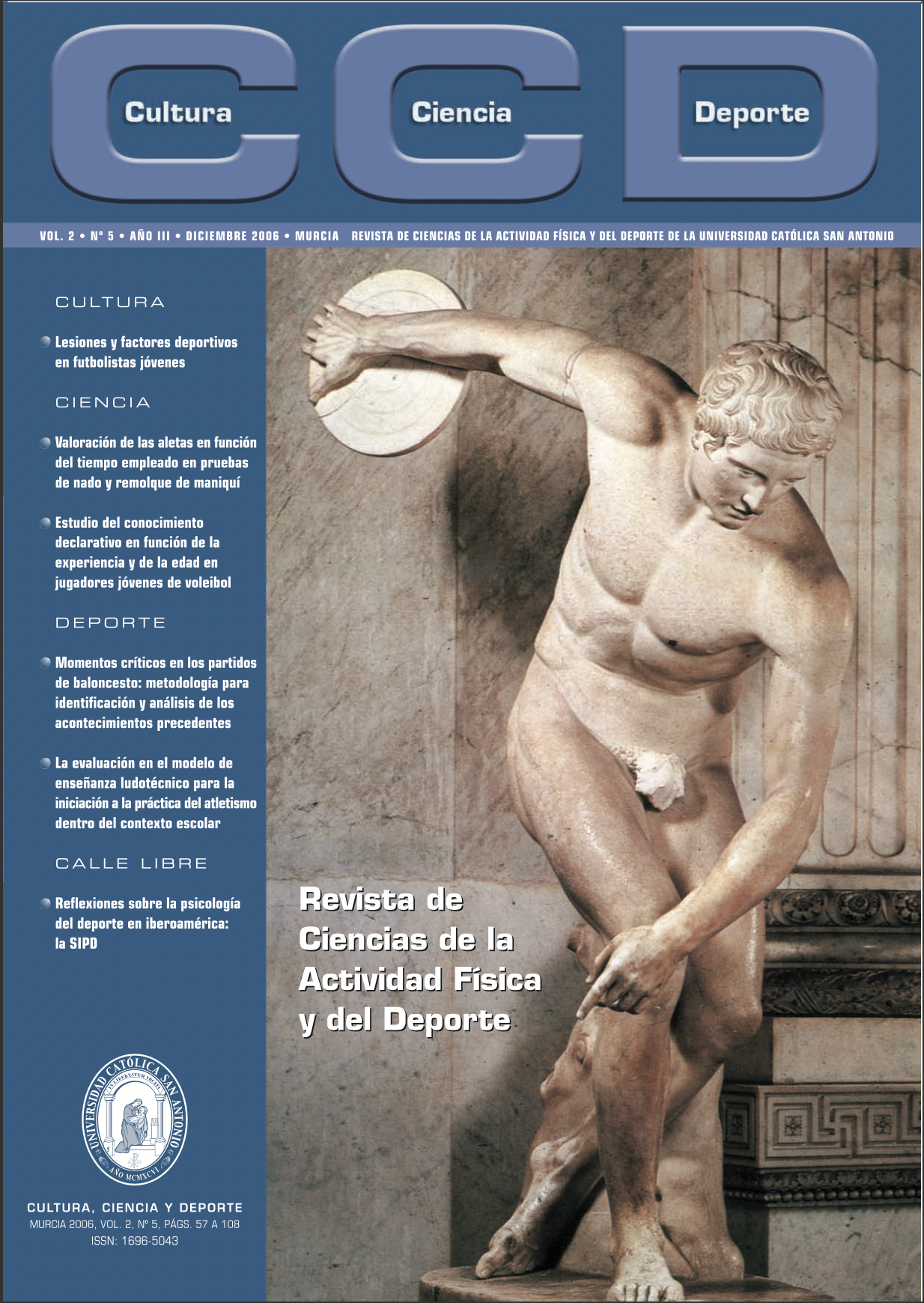Estudio del conocimiento declarativo en función de la experiencia y de la edad en jugadores jóvenes de voleibol. (Study of declared knowledge according to experience and age in young volleyball players).
DOI:
https://doi.org/10.12800/ccd.v2i5.175Abstract
El aspecto cognitivo es uno de los dominios en los que se basa el rendimiento en el deporte (Janelle y Hillman, 2003). Este componente se manifiesta en mayor medida en deportes de alta estrategia, como el voleibol, debido a la incertidumbre en la que se desenvuelven los jugadores en un entorno de juego real (Thomas, 1994). El propósito del presente estudio fue conocer la influencia de la experiencia y la edad sobre el conocimiento declarativo en jóvenes jugadores de voleibol. La muestra de estudio estuvo compuesta por jugadores de voleibol pertenecientes a dos contextos deportivos diferentes (federado y escolar) y en edades comprendidas entre los 13 y los 16 años (N=485). Se midió el nivel de conocimiento declarativo de cada uno de ellos a través de un cuestionario elaborado para tal fin, adaptado de McGee y Farrow (1987). Los resultados determinaron que a mayor nivel de experiencia y a mayor edad se experimentaba un mayor nivel de conocimiento declarativo. El análisis de varianza realizado reflejó diferencias significativas en el conocimiento declarativo en relación a las variables experiencia (F=97,87; p<0,001) y edad (F=35,98; p<0,001). Estos resultados son similares a los obtenidos en diversos estudios basados en la pericia deportiva en voleibol, manifestando que los jugadores con mayor nivel de experiencia en voleibol poseen un mayor nivel de conocimiento general del juego (Mesquita y Graça, 2002; Moreno, Moreno, Ureña, Iglesias y Del Villar, en revisión). De la misma manera, en otros estudios en los que se ha utilizado el cuestionario como instrumento de medida del conocimiento, se han obtenido mejores resultados en jugadores con mayor experiencia que en jugadores con menor experiencia (French y Thomas, 1987).
Palabras clave: conocimiento declarativo, pericia deportiva, rendimiento y voleibol.
===
Abstract
The cognitive aspect is one of the domains in which the sport performance is based (Janelle y Hillman, 2003). This component is more important in high strategy sports, as the volleyball, so to the uncertainty in which the players are unrolled in a real game environment (Thomas, 1994). The purpose of this study was to know the declarative knowledge in youth volleyball players and the experience and age influence in the declarative knowledge. Participants in this study were volleyball players of two differents sport contexts (federative and scholl) and 13-16 years old (N=485). The declarative knowledge was assessed on a McGee and Farrow adapted test (1987). These results show that the high experience and age reveal higher levels of declarative knowledge. ANOVAs show significant differences existed in declarative knowledge according to the years of experience (F=97.87; p<.001) and age (F=35.98; p<.001). These findings are similar to the obtained in volleyball expertise studies, demonstrating that the players with higher experience possess a higher level of game general knowledge (Mesquita y Graça, 2002; Moreno et al., en revisión). In other studies in which the questionnaires have been used as knowledge measurement instrument, a higher level has been obtained in players with high experience that the players with down experience (French y Thomas, 1987).
Key words: declarative knowledge, sport expertise, performance and volleyball.
Downloads
How to Cite
Issue
Section
License
The authors who publish in this journal agree with the following terms:
- The authors retain the copyright and guarantee the journal the right to be the first publication of the work as well as licensed under a Creative Commons Attribution License that allows others to share the work with recognition of the authorship of the work and the initial publication in this journal.













